How to Make Perfect Bulking Breakfast (Examples Included)
Author:
Unlock your full potential by engaging with our experts and community! Have questions about your fitness journey or looking for expert advice on weightlifting techniques? Don’t hesitate — leave a comment below and Jacek Szymanowski will provide a personalized answer and insights to help you reach your goals.
Torokhtiy is reader-supported. Some links are affiliate links, and we may earn a commission at no extra cost to you. See our disclosure page for details.
We’ve all heard the old “Breakfast is the most important meal of the day.” But in the age of Intermittent Fasting and all other dietary trends, is bulking breakfast necessary for those who look to put on some muscle? Let’s have a look at what science has to say.
Bulking breakfast kickstarts muscle synthesis and fuels workouts when used as a pre-workout meal. However, it’s not essential if total daily caloric and protein goals are met. Crafting a balanced breakfast with complex carbs, protein and healthy fats can optimize muscle gain while monitoring your overall diet ensures bulking success.
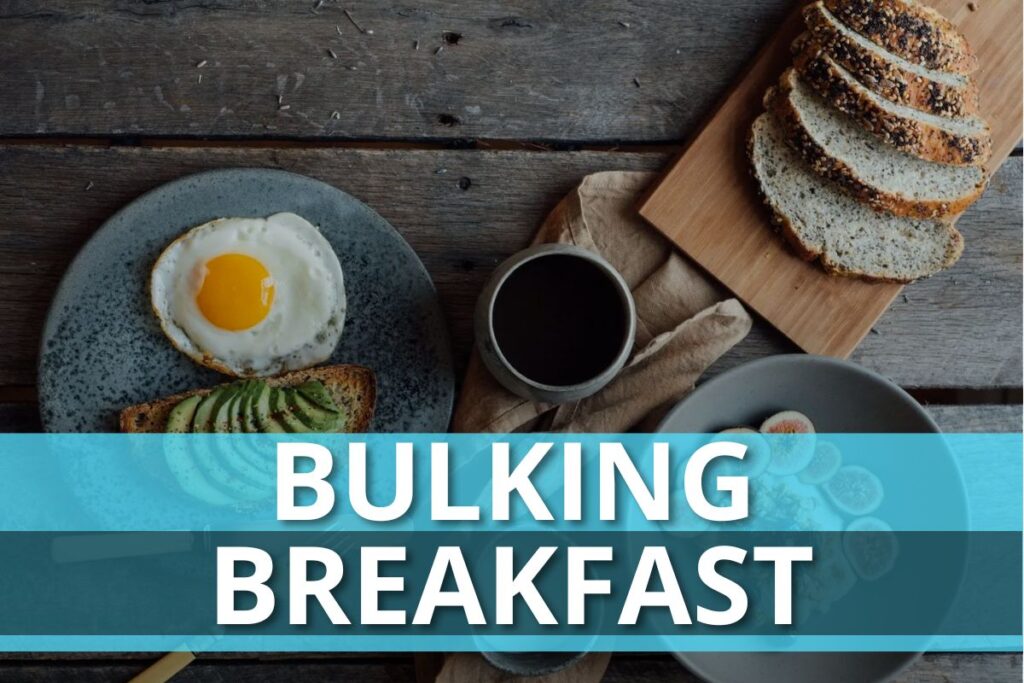
Is Breakfast Necessary for Bulking?
Ever experienced a morning when the day is already in full swing but your hunger isn’t? It might leave you wondering whether skipping that bulking breakfast is going to sabotage all your hard work. Here’s the deal:
While breakfast is not an absolute requirement for bulking, there are potential benefits to eating breakfast that can optimize the muscle-building processes. Let’s explore why:
The bulking breakfast has its physiological advantage. Simply said – your body can store kcal in the form of glycogen and fat tissue quite efficiently, with the protein, case is not that simple when we are considering the optimal environment for muscle growth.
Picture your body as a constant wrestling match between protein synthesis (anabolic/building up) and protein breakdown processes (catabolic/breaking down). The outcome of this battle determines whether you will gain or lose muscle.
So if you want to support the muscle-building side, you can do so by first taking care of hitting your daily protein intake – a good place is to aim for 1.6-2.2g/kg/day.
Then the second important is to spread this amount evenly throughout the day – given the limited protein storage mechanism, you would want to keep this reservoir always full by supplying the body with regular protein meals.
Lastly, to optimize the bulking process, consider your workout timing and protein consumption by having a pre- and post-workout protein meal.
If you happen to delay breakfast until noon but still manage to fit in those meals before bedtime, you’ll still be on the right track. However, pushing breakfast later and later might hinder your muscle protein synthesis potential and leave the catabolic wrestler to take over until your first meal.
Also forget about muscle growth without proper training stimulus and adequate recovery. Training, Nutrition, Sleep/Recovery – none of them is more important than other for muscle growth, it simply won’t happen without all of them being covered.

Long periods of fasting don’t impact muscle growth. However, the potential negative impact comes from reduced strength during fasted strength training. This decrease in strength might result in lesser progressive overload over time, and we know that’s the cornerstone for muscle growth.
The lack of immediate fuel may hinder one’s ability to push through intense training sessions, potentially compromising the effectiveness of the workout and the overall bulking progress.
Therefore, having a nutritious breakfast before a morning workout could provide the necessary energy and strength, promoting better performance, overload, and consequently, better muscle gains.
However, breakfast is not mandatory for bulking. People who prefer to fast in the morning or eat later can still meet their calorie and protein needs required for growth.
Some may even find omitting breakfast improves their appetite for bigger meals later on. In conclusion, eating breakfast can provide optimization, but is not absolutely necessary for muscle gain. People should tailor meal timing to individual preferences.
How to Make Bulking Breakfast?
You may have experienced having breakfast and ended up hungrier later in the day. This might be due to consuming high quick-digesting carbs, and not including sufficient protein, fiber and healthy fats on your plate.
If your breakfast contains highly refined, low fiber or low protein foods, then you will undoubtedly be left feeling hungrier shortly after. Building the perfect bulking breakfast isn’t just about consuming calories – it’s about balancing macronutrients to fuel your body for muscle growth and energy throughout the day.
Once you’ve decided breakfast can offer optimization on your muscle-building journey, it’s time to start crafting the best muscle building breakfast to start your day.

1. Choose a Carbohydrate Base
If you exercise some form of physical activity you know how important carbohydrates are to fuel your workouts and ensure proper recovery. School time – let’s talk carbs. All kinds of carbs are broken down by the body into glucose and fructose – what’s more important is the speed of this breakdown process and that separates simple from complex carbs.
Simple carbs get converted quickly into glucose, providing fast fuel to the body – great application as a pre-workout or during intense workouts. Complex carbs are more difficult to break down and thus take more time additionally they often contain fiber, micronutrients – vitamins, minerals and antioxidants – things we won’t usually get from refined grain products like white pasta or white bread.
Much like a crowded wagon takes more time for all its passengers to disembark, complex carbs release glucose into the bloodstream at a much slower pace. This release rate is called the Glycemic Index. The faster the carb raises your blood glucose, the higher its GI. Why does this matter?
Large blood sugar spikes and crashes from high GI foods can leave you with lower energy and spike hunger. A gradual glucose release keeps you fuller for longer and is linked to benefits like better weight control, heart health, and cognitive performance. Moreover, fiber in complex carbs will not only keep you full for longer but it is also known to help lower LDL cholesterol, triglycerides, and total cholesterol.
Some excellent complex carb choices to incorporate into your bulking breakfast ideas include:
- Whole grains like oats, quinoa, buckwheat, and whole wheat pasta. These provide important fiber, B vitamins, and minerals like magnesium and selenium. Focus on minimally processed grains over refined.
- Legumes including beans, lentils, and chickpeas can be added to omelets or veggie muffins for extra protein, fiber, iron, zinc, and phosphorus.
- Sweet potatoes deliver fiber, vitamin A, vitamin C, potassium and magnesium. Bake and add to breakfast bowls or hash.
- Starchy vegetables like potatoes and winter squash also make nutrient-dense additions. They provide antioxidants like beta-carotene.
The key is choosing less processed, fiber-rich whole foods with a variety of micronutrients. Focus on whole food options over refined grains to optimize the nutritional quality of your bulking breakfasts.
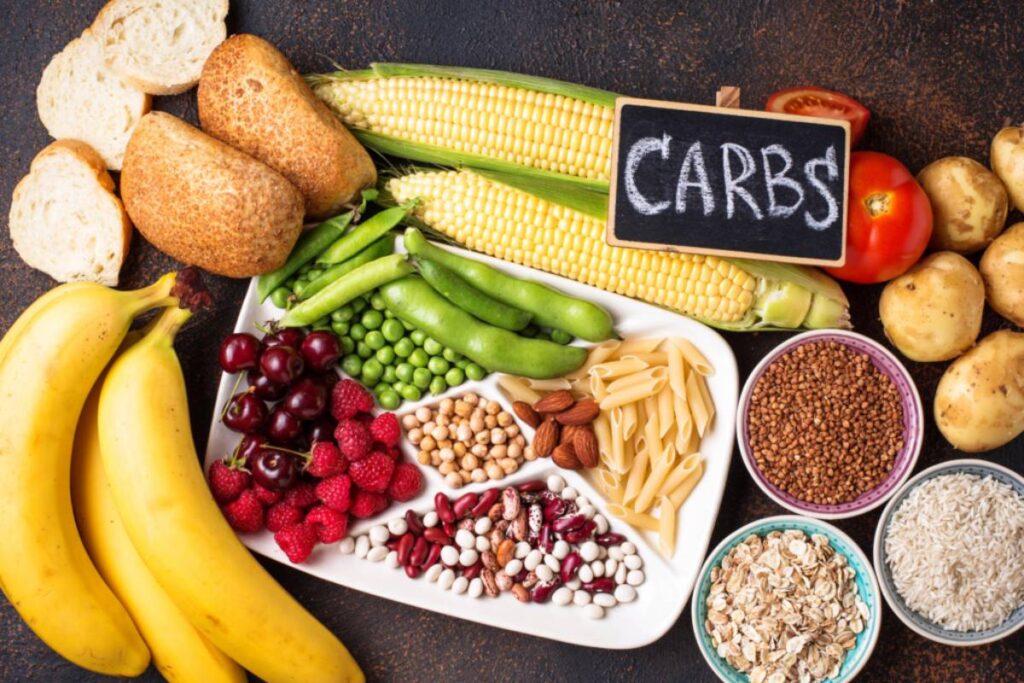
2. Choose a Protein Base
Protein is essential for repairing damaged muscle fibers and activating muscle protein synthesis after intense resistance training. Without adequate protein intake, muscles remain in a catabolic state unable to fully recover and grow.
Proteins are vital for several bodily functions beyond muscle maintenance, including producing hormones like insulin, facilitating enzyme reactions essential for metabolism, and supporting the immune system by forming antibodies and other immune cells.
Research shows consuming 20-40g of high-quality protein within an hour or two of waking counteracts the rise in muscle breakdown that happens overnight during fasting. Early protein intake flips the switch to put muscles in an anabolic, muscle-building state primed for gains.
The amino acid leucine is key for switching on protein synthesis. Focus your high protein breakfast for muscle gain on complete proteins rich in leucine like eggs, Greek yoghurt, cottage cheese, and meat to optimize growth.
Spreading your protein across all your meals provides a steady supply of amino acids to continuously repair and build muscle. Here are some great protein choices:
- Meats and poultry – Wild Game Meat, Beef, Turkey, chicken are great protein sources. Avoid highly processed tho, cook at home.
- Eggs – Excellent source of leucine to stimulate muscle protein synthesis. Also provide iron, choline, selenium, vitamins A, B12.
- Greek Yogurt – High in protein, calcium, potassium and probiotics. Rich in casein protein that provides sustained amino acid delivery.
- Cottage Cheese – Packed with casein protein, calcium, B vitamins, and phosphorus.
- Protein Powder – Easy way to add protein and leucine. Can be plant or animal-based. Can be mixed into smoothies, oats or baking.
- Milk – provides protein, calcium, vitamins A and D to aid bone health.
- Soy Foods – Tofu, tempeh, edamame offer complete plant proteins with all essential amino acids.
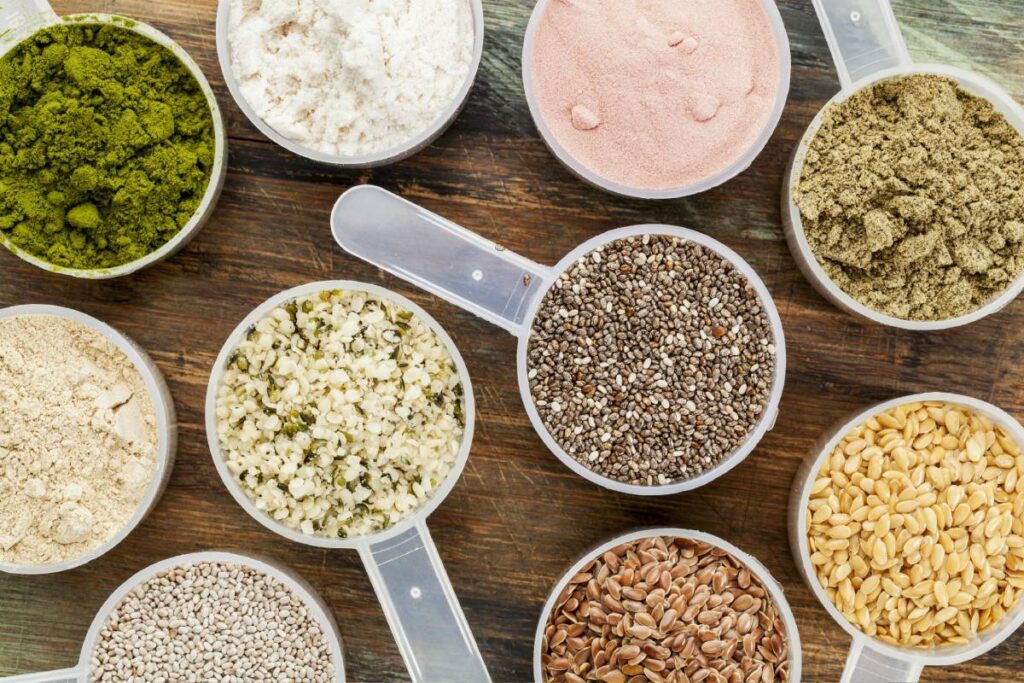
3. Add Fats if Needed
While protein builds muscle, fats play a key role as well in the muscle-bulking journey. Very low-fat diets can suppress testosterone and the absorption of fat-soluble vitamins A, D, E, and K that support recovery.
Monounsaturated fats from foods like olive oil, avocados, and nuts help reduce inflammation from training. Omega-3s in fatty fish like salmon, walnuts, chia and flaxseeds also decrease muscle damage. The calories from fats help meet increased demands without restricting carbs/protein.
However, higher fat, higher fiber foods may slow digestion, so lighter options may be preferred pre-workout. Options to incorporate in your breakfast bulking meals are:
- Avocado – Provides antioxidants like lutein, zeaxanthin, and monounsaturated fats
- Olive oil – High in anti-inflammatory monounsaturated fats and vitamin E
- Nuts – Contain fiber, protein, vitamin E, magnesium, antioxidants
- Seeds – Chia, hemp high in fiber, protein, anti-inflammatory omega-3s
- Coconut – Medium chain triglycerides (MCTs) provide quick energy and lauric acid has antimicrobial properties
4. Add Fruits for Desert
When you’re deep into a bulking phase, it’s common to get overly absorbed in hitting your protein and carb targets. However, integrating fruits into your daily diet can make a world of difference. Fruits are not only refreshing but also packed with antioxidants, fiber, vitamins, and minerals.
Berries, for example, offer anthocyanins and polyphenols that reduce inflammation and oxidative stress. Bananas contain potassium to replace electrolytes lost while training. Citrus fruits provide immune-supporting vitamin C.
Aim to consume 4-5 servings of fruits each day – just to give you a better idea, one serving is roughly the size of your fist. Now, while fruits are nutrient-rich, they also contain calories, so moderate your intake according to your daily calorie needs.
A breakfast for muscle gain is the perfect opportunity to include fruits and ensure you’re fueling your body with everything it needs to build muscle efficiently.
Here are some fruit options:
- Berries: Blueberries, raspberries, strawberries, blackberries
- Bananas: Potassium, vitamin B6, vitamin C
- Citrus fruits: Oranges, grapefruits, lemons high in vitamin C
- Stone fruits: Cherries, plums, peaches contain polyphenols
- Exotic fruits: Mangos, pineapple, kiwi, papaya high in vitamin C
Here are some excellent breakfast ideas for bulking, combining all the components above.
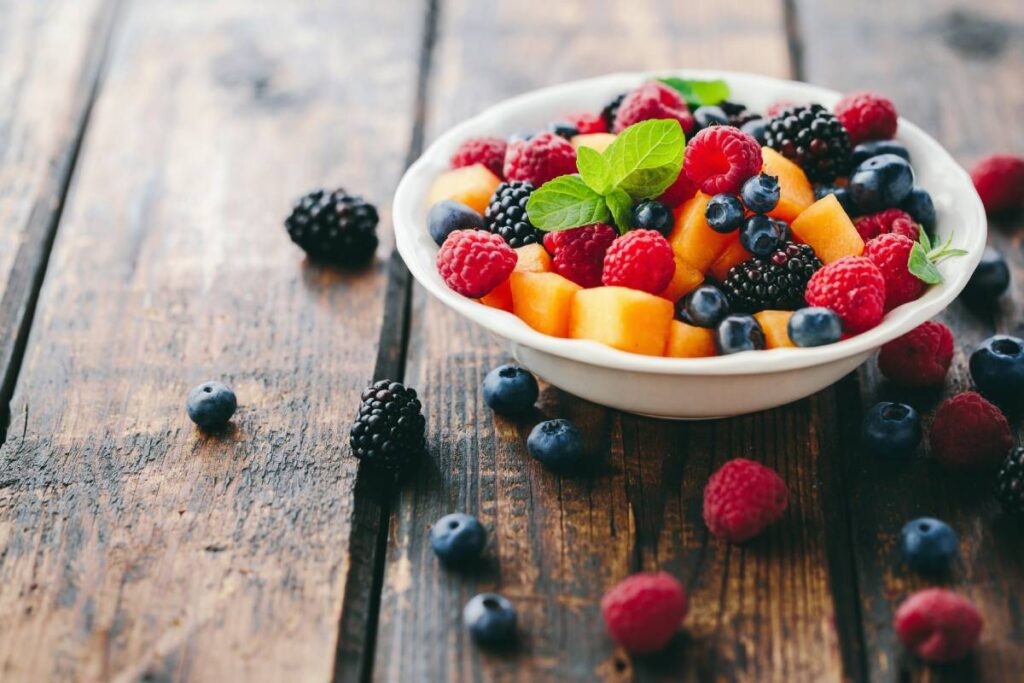
Examples of Foods Combinations for a Bulking Breakfast
✅ Combo #1: Protein Oatmeal Porridge
Protein source:
- Protein powder: 1 scoop (typically 20-25g of protein)
- Greek yogurt or cottage cheese: 2 tbsp (around 5-10g of protein)
Fats source:
- Almond butter or peanut butter: 1 tbsp
- Optional: Add some hemp hearts, chia seeds, or flax seeds for an extra nutritional boost
Carbs & Fiber source:
- Oats (1/2 cup): Rich in soluble fiber, aiding digestion
- Milk (of your choice) 1/2 cup
- Banana: 1 (additional fiber source)
- Berries (A handful): High in fiber and antioxidants
✅ Combo #2: Wholesome Breakfast Burrito
Protein source:
- Eggs or Eggs and egg whites: 4 eggs or 2 eggs and 2 egg whites (around 28g of protein)
- Turkey sausage links: 2 (protein content may vary)
Fats source:
- Olive oil: 2 tbsp
- Avocado slices: High in fiber
Carbs & Fiber source:
- Whole wheat tortillas (2): More fiber compared to white tortillas
- Sweet potato (1 small): Excellent source of fiber
- Black beans (1/4 cup): High in fiber and protein
✅ Combo #3: Egg Avocado Ham Toast Combo
Protein source:
- Eggs: 2 eggs (protein content may vary, usually around 10-14g of protein)
- Ham: 2 slices (about 10-14grams of protein)
Fat source:
- Avocado (1/2 medium avocado): High in fiber
- Note: The eggs also contribute to the fat content (about 10g of fat) and the ham (3-5g of fat)
- Optional: Add hemp hearts or nutritional yeast for extra flavor and micronutrients
Carb & Fiber source:
- Whole grain toast (2 slices): Packed with fiber, helping to keep you full
- Fruit as a desert for additional carb and fiber source
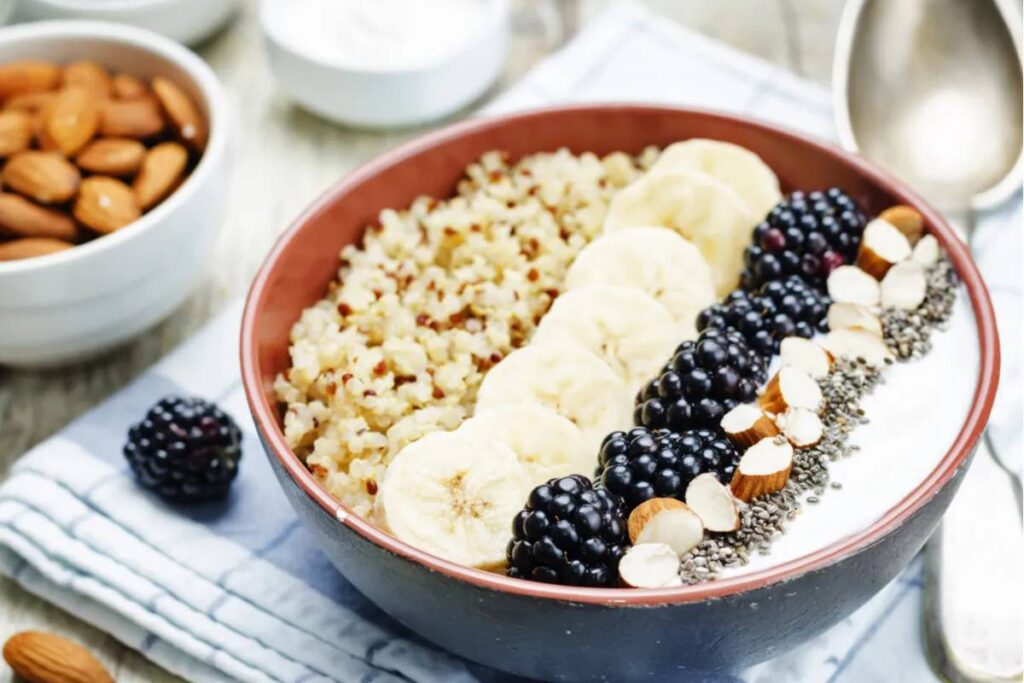
Essentials for a Successful Bulking Phase
A well-planned bulking phase requires carefully tailoring training, nutrition, and lifestyle factors to maximize muscle growth.
Start by determining your caloric needs and aim for a modest surplus, around 250-500 calories over maintenance. Fuel these extra calories through a balanced intake of proteins, carbs, and healthy fats.
You may try to spread evenly over 5-6 small meals per day to slightly optimize muscle growth. This provides muscles with a steady supply of nutrients to support hypertrophy.
But here’s the thing: muscle growth leans more on how much you do (total workout volume) rather than how hard you push in each session. So, if you’re going all out with more sets and reps, give yourself a bit more downtime to recover.
When you’re hitting the weights hard, your body’s glycogen depletes, dropping by as much as 39%. If you’re unable to immediately access food, particularly carbs, don’t panic– it’s not a deal-breaker – carb timing is less important for muscle growth than it’s often presented.
For those needing more calories, adding carbs like a banana or oats to a protein shake can be handy. But again, it’s a nice-to-have for convenience, but not essential. Keep your post-workout nutrition practical and adaptable to your needs. When we talk protein, forget the 40-minute rush for protein – that’s bro science.
In reality, this window extends to 4-6 hours and consuming 20-40g of high-quality protein is important to provide amino acids to kickstart muscle protein synthesis. If your last meal was 2-3+ hours pre-workout or happened that you trained fasted, strive for protein intake within 1 hour post-training for optimal results.

Although this window potentially extends ~24 hours post-training (at least for young folks), there is just no benefit of not eating sooner after working out for anabolism. Again, your biggest priority should remain meeting total daily protein.
Supplements like whey protein, creatine and mass gainer can help meet nutritional needs, but whole foods should form the foundation of your diet. Stay hydrated and eat plenty of micronutrient-rich foods – meat, fruits, vegetables, nuts and seeds to support overall health.
Get at least 7-9 hours of sleep per night to allow growth hormone peaks during deep sleep cycles. Monitor your progress regularly and adjust your training or nutrition plan as needed based on your results. Consulting the right professionals can help optimize your regimen for maximum gains.
With strategic programming tailored to your individual needs and goals, you’ll be well-equipped for sustainable success in your bulking journey.
1. Adhering to a Diet With a Modest Caloric Surplus
Bulking, essentially, comes down to consuming more calories than you burn on a daily basis. But it’s not just about quantity, it’s about quality and strategy as well. There are numerous ways to approach bulking, but some strategies are proven to be healthier and more effective than others.
Now, while it’s true that some can build muscle at maintenance calories, the golden protocol to optimal muscle gain remains a slight caloric surplus usually about 250-500 calories more than your total daily energy expenditure.
You may hear the popular, yet misguided saying “eat big to get big” encouraging excessive eating, but this careless approach often leads to unwanted fat gain. Instead, focus on “lean bulking” with a controlled calorie increase.
This provides your body adequate extra fuel for muscle growth without promoting excessive fat accumulation. A modest surplus allows for steady progress each month by creating a muscle-building environment, not an overfed free-for-all.
With a strategic calorie increase fueled by nutritious whole foods, you can bulk up sustainably and see satisfying results week-to-week without unnecessary fat gain. Moderation and balance are key for successful bulking.
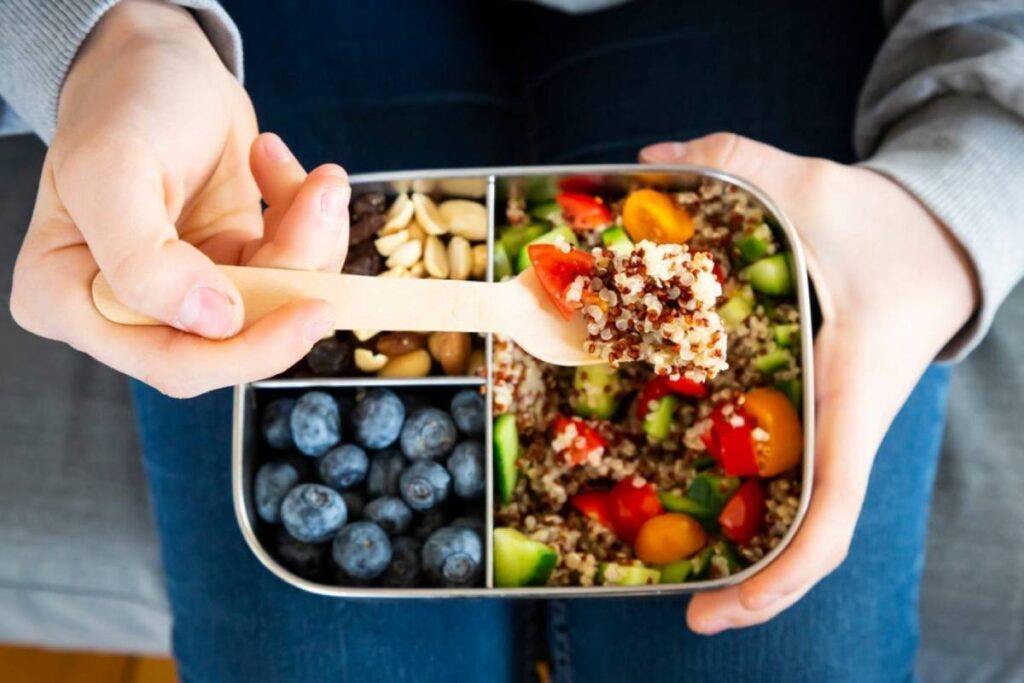
2. Breakfast: Just a Part of the Big Picture
For those who struggle to eat big, it’s worth noting that skipping that high calorie bulking breakfast can make it more challenging to meet your calorie targets.
Even if you don’t monitor your food intake, one study on whole day fasting shows that we participants didn’t compensate for the missed calories from the 36h fast. But please understand that different protocols could lead to different results.
That’s indeed the reason why intermittent fasting (IT) can be a very useful weight loss tool for some – it simply puts them into a calorie deficit. However IT can be hard to stick to, potentially being unsustainable for most people. Since usually losing weight is easier than keeping it off, more research is needed on the long-term viability of IT.
If your goal is to increase muscle mass, incorporating a high calorie breakfast for bulking into your diet can contribute to achieving a caloric surplus. Yet, remember, breakfast is just one meal. At the end of the day, what truly matters is your total daily caloric intake. So, if you occasionally skip it, don’t sweat it too much.
Focus on the bigger picture and make sure you are consuming enough calories throughout the day to support your bulking goals.
3. Balancing Calorie Surplus With Nutritional Quality
Now that we’ve exhausted the topic on the importance of a calorie surplus for bulking and the necessity for nutritious foods, let’s get real – sticking to a diet solely of chicken and broccoli throughout your bulking journey can be extremely monotonous and leads to demotivation.
Here’s a comforting thought – as long as you do not exceed your daily calorie target, you can include some of your favorite fun foods into your diet. Here’s where the 15% rule comes into play, allowing some room for those yummy foods. Although they might not be as nutritious, they help make your diet more enjoyable and sustainable.
The idea is to strike a balance, ensuring that the majority of your diet is nutrient-dense to support muscle growth and recovery, while also allowing for some variety to keep your meals interesting and enjoyable.
For instance, if your daily calorie intake is 2800, you have a 420-calorie room for more flexible food choices. That is sufficient for one slice of pizza, one ice-cream scoop, or a small piece of chocolate cake.

4. Importance of Weight Gain Monitoring
Weight monitoring, as mentioned earlier, is a vital aspect of a successful bulking regimen.The goal here is to ensure that your weight gain is attributed to muscle growth, not unwanted fat accumulation.
A practical approach is to log your body weight a minimum of three times a week to account for daily fluctuations, primarily occurring in the morning before consuming any food or fluids. Body weight trends per week are useful markers for diet and/or workout changes to maintain progress towards your bulking goals.
Besides, progress, photos and other independent body fat tests such as DEXA scans and skin calipers can provide a more accurate picture of your muscle and fat gains. Lastly, if not too overwhelming for you, tracking your water intake, sleep, steps and stress could provide even better understanding of how your body is responding to a bulking cycle.
Keeping a tab on these variables together with your weight can provide an better indication of how well your body is getting hydrated, rested, and fueled for proper muscle building.
The Mass Gainer We Recommend
Transparent Labs Mass Gainer
- Suitable for Vegans: No
- Flavors: Chocolate Glaze Donut, Sweet Vanilla
- Calories per serving: 750 KCAL
- Carbs per Serving: 110 grams
- Protein per Serving: 53 grams
- Carb-to-Protein Ratio: 2:1
- Number of Servings: 15
- Serving Size: 194 grams (2 scoops)
- Price per Serving: $5.34
- Company Founded: 2015
- Recommended by Athletes: Hafþór Júlíus Björnsson, Pat Li, PAULINA
When it comes to gaining mass, the right supplement can be a game-changer.Our top pick is Transparent Labs ProteinSeries Mass Gainer due to its clean, focused formula. This mass gainer contains a robust yet straightforward blend of proteins and carbohydrates in optimal ratios to facilitate muscle growth and workout recovery.
It packs sufficient calories to support a bulking phase without relying on cheap filler ingredients.The minimal ingredients list contains no artificial sweeteners, colors or preservatives, making it a great choice for those seeking natural sports nutrition.
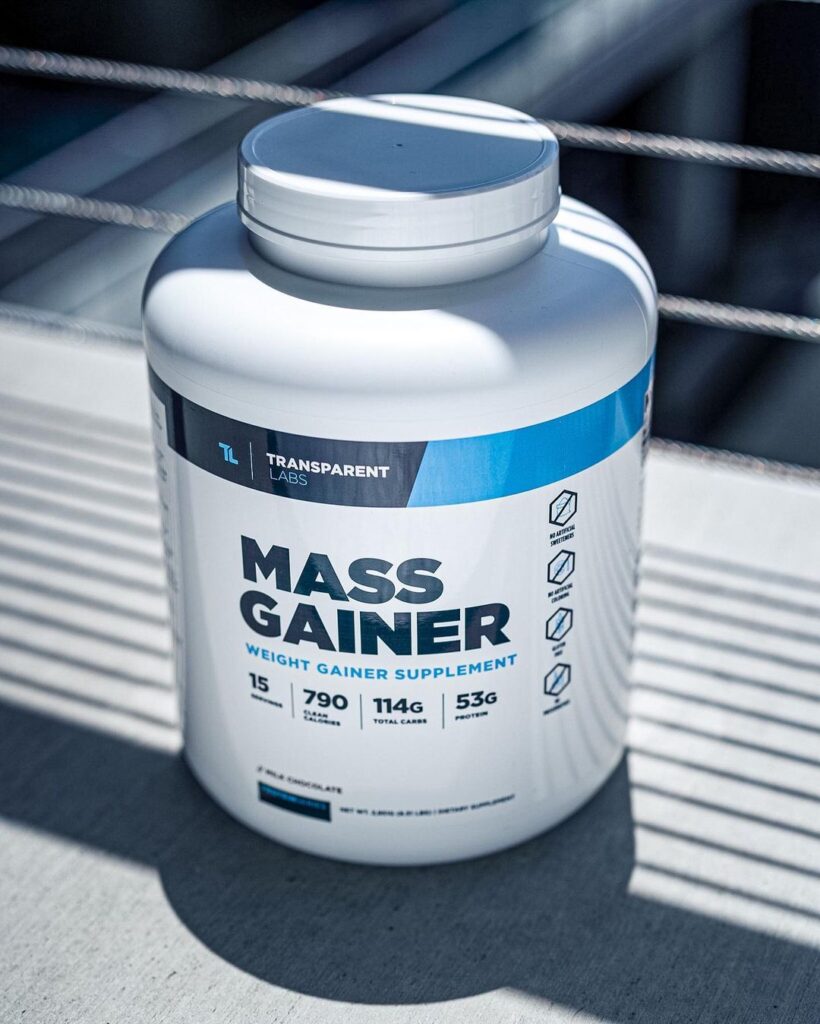
This mass gainer is a reliable choice for those looking to bulk up without the burden of unnecessary ingredients. Take a look at Transparent Labs ProteinSeries Mass Gainer for a detailed dive into its offering.
The Protein Powder We Recommend
A good quality protein supplement is could be highly beneficial for muscle building enthusiasts, that struggle to hit their protein from whole foods. As we’ve discussed protein is the basis of muscle repair and formation.
The Legion Athletics Whey+ Protein Powder receives our nod especially the Strawberry Banana and French Vanilla flavors. It is a combination of taste and effectiveness. Made from quality ingredients for excellent premium protein intake towards your muscle recovery and building.
The quality speaks for itself, and the Strawberry banana and French vanilla flavors are a treat to the tongue. They have a sweet and palatable flavor profile which makes taking in your proteins an amazing experience and not a burden.
Additionally, the ingredient list is simple, making sure that the product has no unnecessary additions. Delivering quality protein for what your muscles demand, is exactly the essence of the product that ensures your muscle building journey.
FAQ
What Should You Eat for Breakfast on a Bulk?
For a bulking breakfast, aim for a nutritious mix of protein, carbohydrates, and healthy fats. A meal with eggs, whole-grain bread, avocados, a protein shake, and some fruits can be a great start to promote muscle growth and maintain energy levels.
Is Oats Good for Bulking?
Absolutely! Oats are a fantastic choice for bulking due to their high content of complex carbohydrates and fiber. They offer steady energy release, support digestion, and can be effortlessly combined with protein and fats for a well-rounded meal.
Is 4 Meals a Day Good for Bulk?
Yes, we know that the old bodybuilding myth of eating every 2 hours to keep “that metabolism boosted” is well debunked. If the meals are well-balanced, this approach ensures a steady supply of energy and nutrients, promoting muscle growth, recovery, and continuous protein synthesis throughout the day.
Conclusion
While breakfast isn’t a strict requirement for bulking, it offers its benefits, especially if used as a pre-workout meal. It supports protein synthesis and aligns with the body’s hormonal rhythms, enhancing nutrient utilization.
Although the bulking breakfast can be a great tool, personal preferences and your total daily macronutrient intake remain the most important. What’s your experience with bulking breakfast? Share your thoughts or tips in the comments below.
Also read:
- Best Weight Gain Supplements for Teenage Athletes
- Weight Gain Smoothies
- Best Cereal for Bulking
- Are Potatoes Good for Bulking
- Dirty Bulking or Clean Bulking
- Bulking Protein Shake
- How to Gain Fat in Butt
References:
- Kerksick, Chad M., Colin D. Wilborn, Michael D. Roberts, Abbie Smith-Ryan, Susan M. Kleiner, Ralf Jäger, Rick Collins, et al. 2018. “ISSN Exercise & Sports Nutrition Review Update: Research & Recommendations.” Journal of the International Society of Sports Nutrition 15, no. 1 (August). https://doi.org/10.1186/s12970-018-0242-y.
- Churchward-Venne, Tyler A, Nicholas A Burd, and Stuart M Phillips. 2012. “Nutritional Regulation of Muscle Protein Synthesis with Resistance Exercise: Strategies to Enhance Anabolism.” Nutrition & Metabolism 9, no. 1: 40. https://doi.org/10.1186/1743-7075-9-40.
- “Sugar Crash Effects and How to Fix Them.” 2019. Sanford Health News. December 19, 2019. https://news.sanfordhealth.org/healthy-living/sugar-crash-effects/#:~:text=When%20the%20body%20has%20more.
- Brown, Lisa, Bernard Rosner, Walter W Willett, and Frank M Sacks. 1999. “Cholesterol-Lowering Effects of Dietary Fiber: A Meta-Analysis.” The American Journal of Clinical Nutrition 69, no. 1 (January): 30–42. https://doi.org/10.1093/ajcn/69.1.30.
- Ivy, John L., and Lisa M. Ferguson-Stegall. 2013. “Nutrient Timing.” American Journal of Lifestyle Medicine 8, no. 4 (October): 246–59. https://doi.org/10.1177/1559827613502444.
- Witard, O. C., Jackman, S. R., Breen, L., Smith, K., Selby, A., & Tipton, K. D. (2014). Myofibrillar muscle protein synthesis rates subsequent to a meal in response to increasing doses of whey protein at rest and after resistance exercise. The American journal of clinical nutrition, 99(1), 86–95. https://doi.org/10.3945/ajcn.112.055517
- Apergi, Kiriaki, Kalliopi Karatzi, Kyriakos Reppas, Eva Karaglani, Natalya Usheva, Natalia Giménez-Legarre, Luis A. Moreno, et al. 2022. “Association of Breakfast Consumption Frequency with Fasting Glucose and Insulin Sensitivity/B Cells Function (HOMA-IR) in Adults from High-Risk Families for Type 2 Diabetes in Europe: The Feel4Diabetes Study.” European Journal of Clinical Nutrition 76, no. 11 (November): 1600–1610. https://doi.org/10.1038/s41430-022-01160-z.
- Aoyama, S., Kim, H.-K., Hirooka, R., Tanaka, M., Shimoda, T., Chijiki, H., Kojima, S., Sasaki, K., Takahashi, K., Makino, S., Takizawa, M., Takahashi, M., Tahara, Y., Shimba, S., Shinohara, K., & Shibata, S. (2021). Distribution of dietary protein intake in daily meals influences skeletal muscle hypertrophy via the muscle clock. Cell Reports, 36(1), 109336. https://doi.org/10.1016/j.celrep.2021.109336
- Triki, R., Zouhal, H., Chtourou, H., Salhi, I., Jebabli, N., Saeidi, A., Laher, I., Hackney, A. C., Granacher, U., & Ben Abderrahman, A. (2023). Timing of Resistance Training During Ramadan Fasting and Its Effects on Muscle Strength and Hypertrophy. International Journal of Sports Physiology and Performance, 18(6). https://doi.org/10.1123/ijspp.2022-0268
Why Trust Us?
With over 20 years in Olympic weightlifting, strength training, nutrition coaching, and general fitness our team does its best to provide the audience with ultimate support and meet the needs and requirements of advanced athletes and professional lifters, as well as people who strive to open new opportunities and develop their physical capabilities with us.
By trusting the recommendations of our certified experts in coaching, nutrition, and sports training programming, as well as scientific consultants, and physiotherapists, we provide you with thorough, well-considered, and scientifically proven content. All the information given in the articles concerning workout programming, separate exercises, and athletic performance, in general, is based on verified data.
The product testing process is described in more detail here.
Author: Jacek Szymanowski
Certified Nutritionist,
M.Sc.Eng. Biotechnology
Performance Architect,
Strength and Conditioning Specialist
With over 30 years of fighting experience, specialization in nutrition coaching for athletes, and expertise in metabolic health and dietary strategies, Jacek offers a comprehensive approach to optimizing your performance and well-being. Backed by a Master of Science degree in Biotechnology, Jacek remains at the forefront of scientific advancements, ensuring that his coaching is always evidence-based and up-to-date.



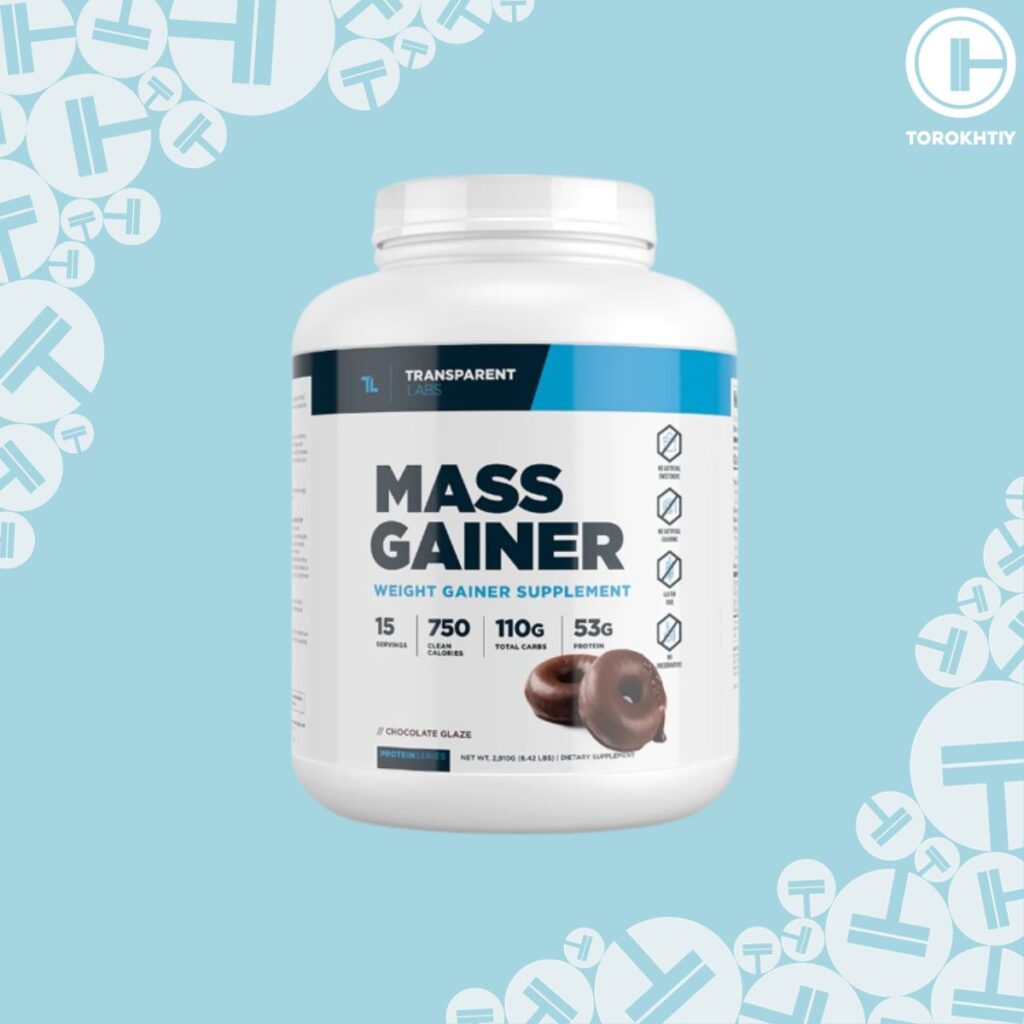
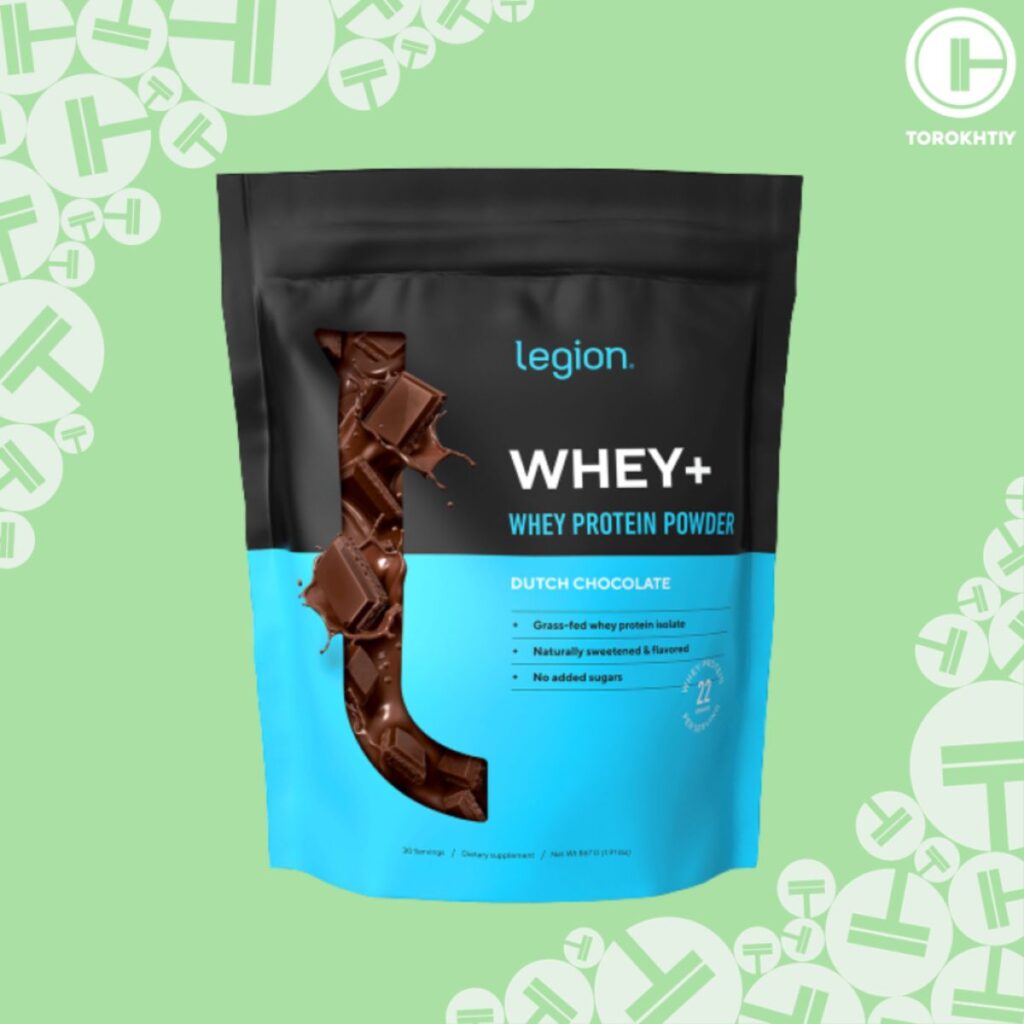
Still have questions after reading our article? Unlock your full potential by engaging with our experts and community! Don’t hesitate — leave a comment below and Jacek Szymanowski will provide a personalized answer and insights to help you reach your goals.